How to make a spruce hedge?
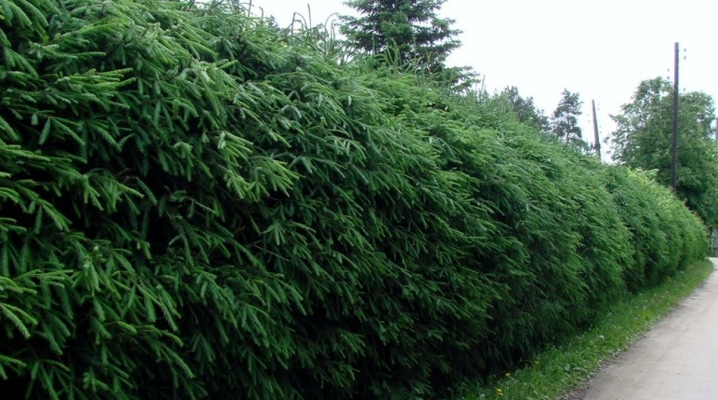
In landscape design, hedges are always highly popular. In recent years, spruce hedges have become fashionable. Such an unusual design of personal plots has a whole army of fans. A hedge made of Christmas trees is easy and simple to plant with your own hands, and maintaining its attractive appearance does not cause much trouble.
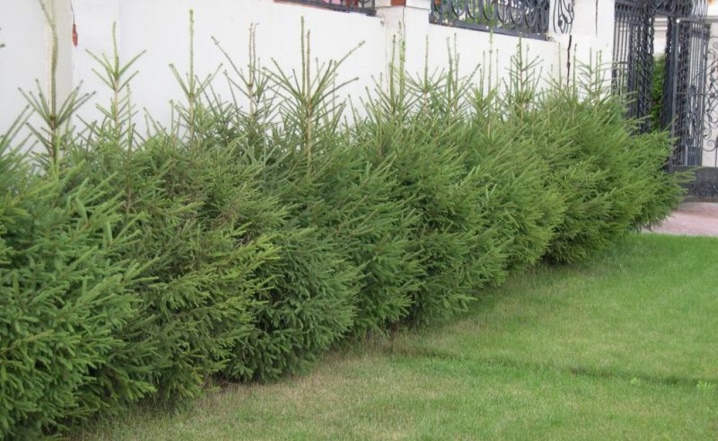
Suitable types of spruce
Ate is a slow-growing coniferous plant that has considerable advantages. They always retain the richness and brightness of colors, regardless of the season, therefore, even in winter, the site looks very impressive and festive.
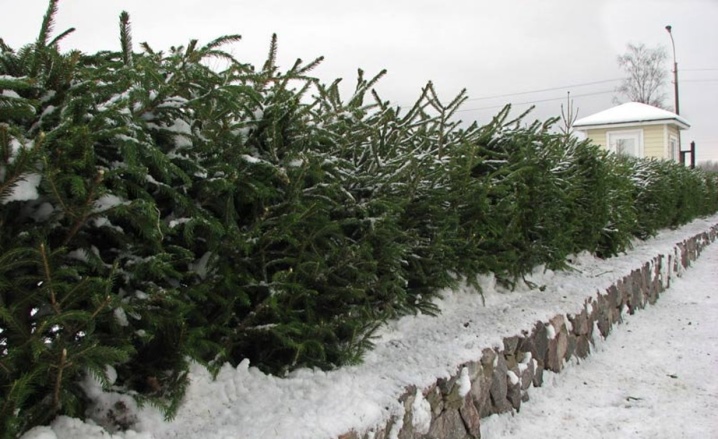
The hedges hide the boring landscapes and unsightly buildings outside the courtyard. With the help of a hedge on the site, you can always arrange a relaxation corner, where you will always participate in a relaxed and peaceful manner.
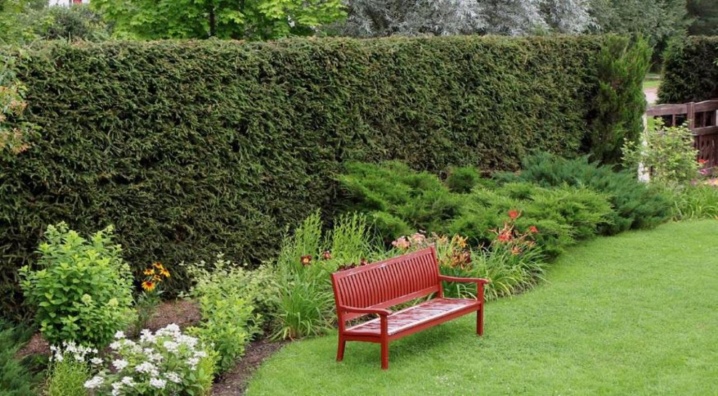
Another advantage of hedges is their ability to trap snow, and dense interweaving of branches will not allow uninvited guests to enter the site. Dense growth protects the house from gusts of wind, dirt, excess noise and gases, and the well-known property of coniferous plantations to emit phytoncides will create a favorable microclimate on the site. In nature, there are a large number of varieties of spruce, they can have the most interesting colors - for example, blue, green and yellowish.
If you combine plantings in a predetermined order, you can create a spectacular composition on your site.
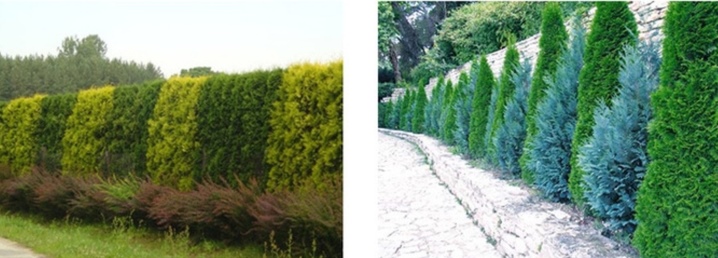
However, most often common spruce is planted along the fence in our country, since this plant is maximally adapted to local climatic conditions. And a pleasant bonus will be the cost of seedlings, which in nurseries starts at 250 rubles (2019). However, suitable healthy young trees can always be found in forest clearings. True, first you should make sure that you do not get the planting material in a forested area, otherwise you will face substantial fines.
Norway spruce calmly tolerates shade; in sunny areas, young plants can get burns from direct ultraviolet rays. This plant prefers sandy loam and loamy soils, reacts negatively to stagnant water, excessive dryness and salinity of the soil. In addition, this type of spruce lends itself well to cutting, which means that forming the crown will not present any difficulty for the owners of the site.
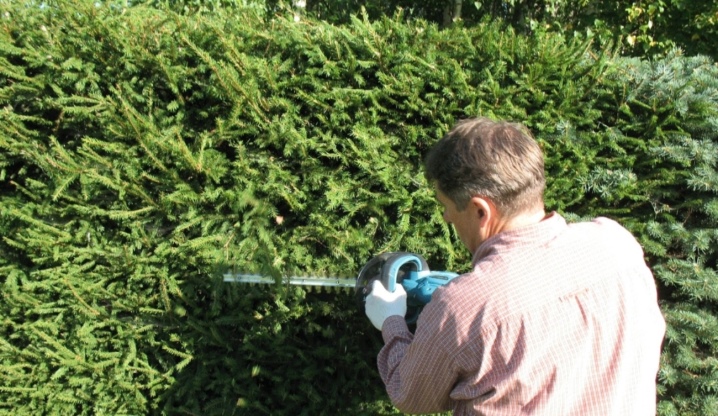
A fence made of ordinary spruce serves as protection for many decades, moreover, every year it only becomes more beautiful and magnificent. To create a trellis type hedge, varieties of olendorfi, invers, as well as cupressin and acrocon are suitable. The height of these spruces is 4-15 meters, the branches are very dense, they grow in the shape of a cone. The trees are quite unpretentious, therefore they get along well even with a densely planted strip.
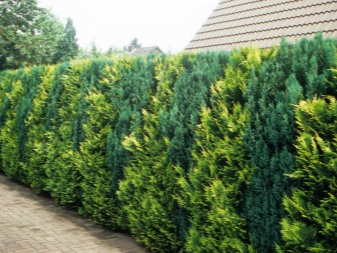
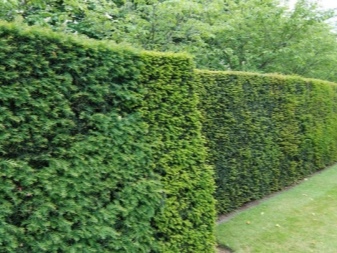
If you plan to get a hedge of medium height, it is best to plant spruce varieties of Froburg or Barry, they grow up to 2 m, while the barry grows so slowly that such a hedge does not even require pruning.
The needles of young plants of these varieties have a light green hue, which looks especially stylish against the background of the dark crown of adult trees. Spruce Wils Zwerg is distinguished by a weeping crown, and a fence made of these seedlings looks rather unusual and can become an adornment of any garden decor. It is better to create border and dividing lines with the help of little jam and echiniformis - these are dwarf Christmas trees, the length of which does not exceed half a meter, the crown of such plants is usually hemispherical or cushion-shaped.
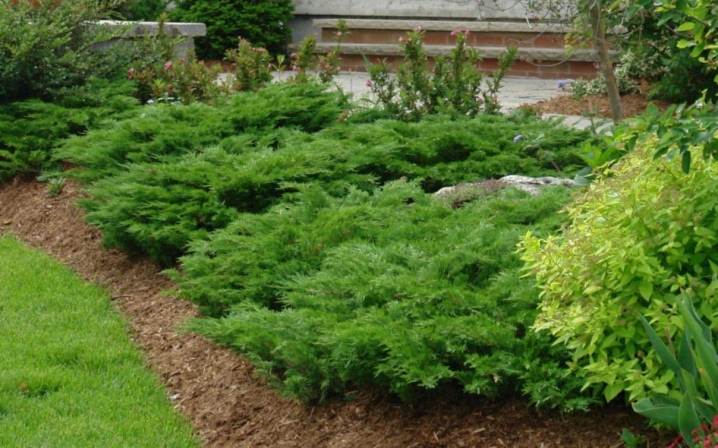
Landing rules
Planting new plants to form a green fence near the fence is best done with the beginning of the dormant stage of the plants. Conifers have 2 of them: the first falls in the last decade of April-May, and the second occurs in September-early October.
Young Christmas trees that you plan to use should be dug out immediately before planting, and the less time passes from the moment a young seedling is removed from the forest land to transplanting to a new place, the better.
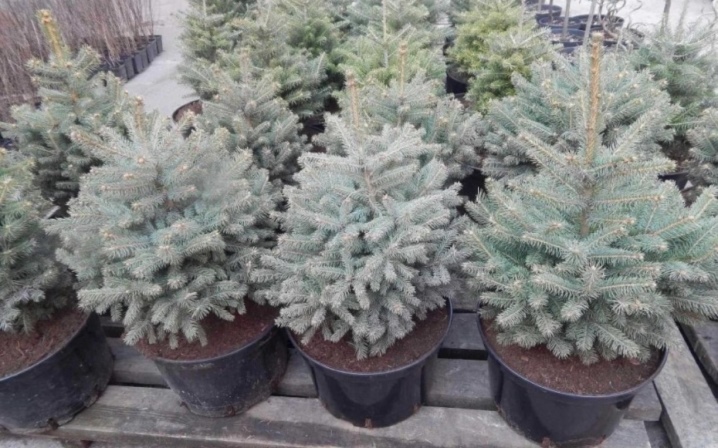
Experienced gardeners recommend taking seedlings at the age of 3-4 years. As practice shows, they take root much more successfully than adult plants. It is optimal to dig up spruce immediately after rain, when the ground is wet, ideally it should be more like a slurry. Ate is removed so that moist soil is preserved on the roots, and so that the earthen lump does not dry out during transportation, it is wrapped in polyethylene or burlap.
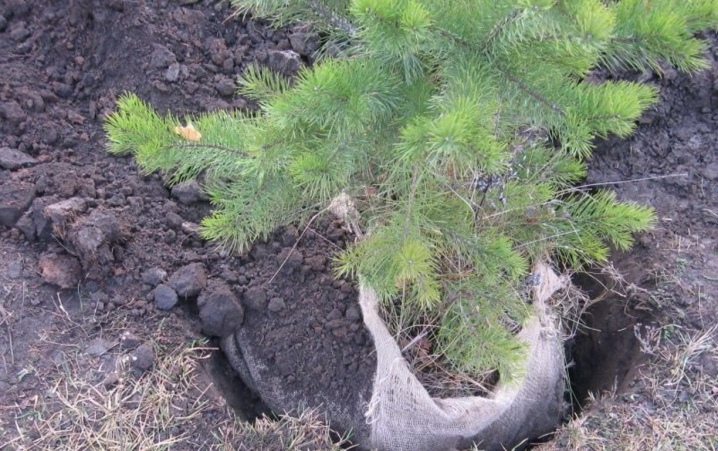
After the seedlings are delivered to the site, there is no need to waste time. Trace the landing area as quickly as possible and dig a trench deep into the shovel's bayonet. The bottom of the pit should be softened and mixed with river sand and peat.
Every gardener knows very well that any seedlings have a surface type root system, so it reacts extremely negatively to drying out.
After planting the tree, it is necessary to thoroughly moisten, compact and mulch a little.
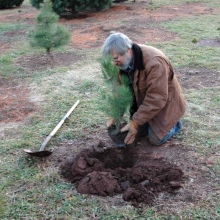
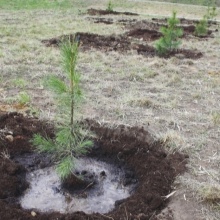
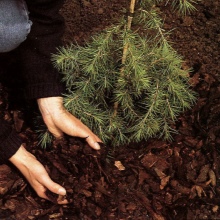
The density and pattern of planting directly depends on the type of hedge that you are forming. So, if you create a living border up to 50 cm high, then leave 35-40 cm between the seedlings, this distance is set aside on the aisle. To form a spruce fence 1.5-2 m high, about 80 cm is left between the bushes, and the first and second rows are planted at a distance of 1.5-2 meters from each other. And if your task is to arrange a spruce wall, the height of which reaches 10 meters, then it is necessary to maintain about 3-4 meters between the seedlings.
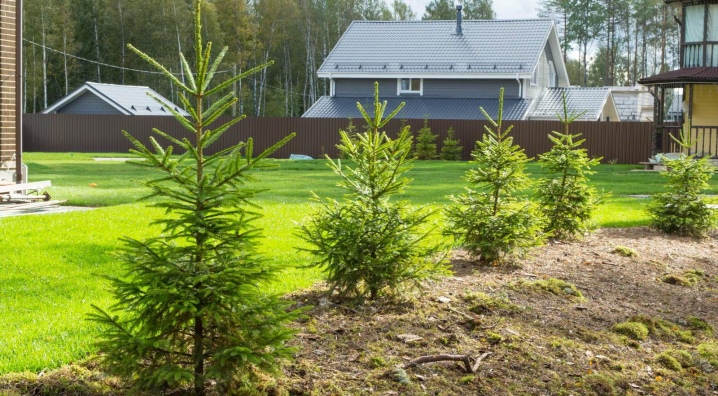
Follow-up care
In order for the trees to take root well in the new soil and start growing, it is important to take proper care of them.
Planting must be watered every 5-7 days (if the weather is rainy, then this is done less often).
It is best to irrigate with a hose with small holes all over the surface.located at a distance of 1 m from each other. In this case, all that is required from the owner of the site is simply to pull the hose along the line of the ephedra and turn on the water. Soon water will pour out of the holes and begin to actively absorb into the ground near the trees.
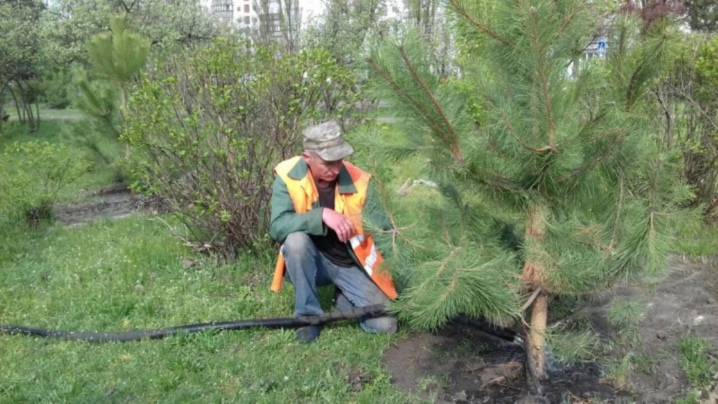
Do not forget about dry watering - the ground near the seedlings must be constantly loosened with a hoe, deepening the tool by 10-20 cm. Young Christmas trees need nutrients, so they need feeding:
- during the first 3 years after transplanting, nitrogen fertilizers should be applied 3-4 times per season;
- every autumn plants need fertilizing with phosphorus-containing components;
- in May and October, formulations designed specifically for conifers should be applied.
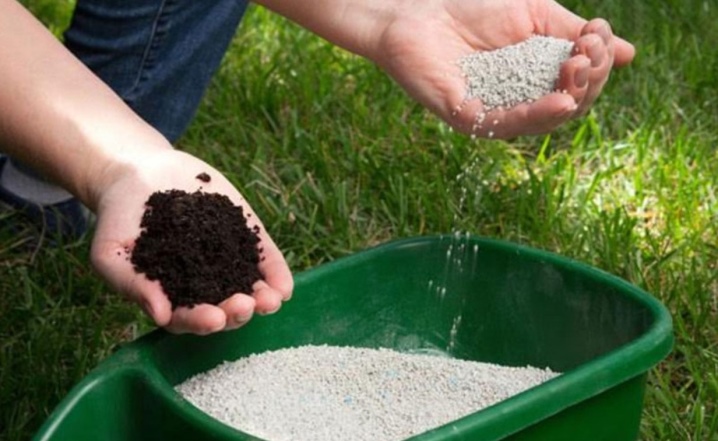
All weeds and grass growing near the plantings must be weeded out. If you deprive the spruce hedge of care, then the needles begin to turn yellow and fall off, and the stems themselves stretch out.
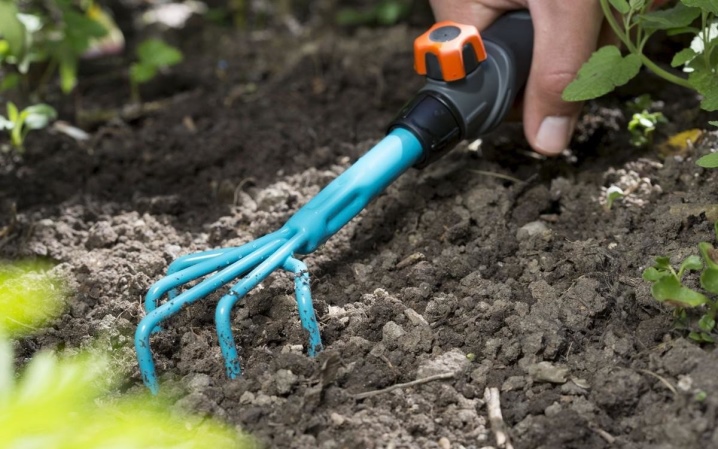
Haircut rules
Any hedge will certainly require a haircut. Remember that it is very difficult to fix a neglected view, and sometimes even impossible. Pruning trees is not only necessary to give them the correct shape. This activity contributes to the maintenance of the healthy appearance and rich color of the needles. A haircut is best done in July - it is during this period that the growth of new shoots ends.To begin with, the entire growth is cut by a third, when the trees reach the desired size, they are cut more - a couple of centimeters above the place of the first haircut. It is imperative to remove the shoots sticking out in all directions.
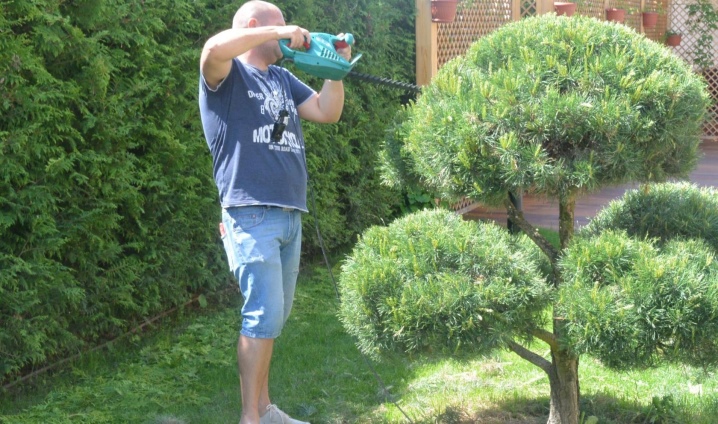
It is not recommended to cut branches older than 3 years, since they begin to grow very slowly immediately after that.
The cutting technique is not difficult. The branches are given an inclined position (in this case, the hedge will be wider at the bottom and eventually take the shape of a trapezoid), after which they are cut off with a tool. For a spectacular look of a spruce hedge, a 3-meter height of plants is most often maintained, after which the gardener no longer needs to spend a lot of time on further caring for his ephedra, although in winter it will still be necessary to remove the entire annual growth from different sides.
The spruce will grow much more luxuriantly if all buds are removed from it in March.and with regular lateral pruning, the spruce fence will take on an even more attractive look.
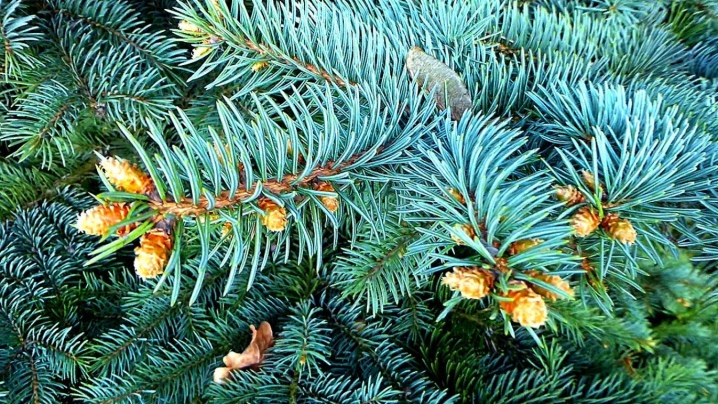
All work must be done very carefully so as not to affect the main branches. If you do not have much experience in shaping a crown, it is best to stock up on a special template or pull a rope along the entire length, which will become a guide during a haircut.
If, in the course of work, out of inexperience, gaps appear through which bare branches will be visible, do not be upset, they will very quickly overgrow with new young shoots, since any pruning stimulates enhanced branching.
Getting the shape right will be much easier if you use quality tools. Keep in mind that a regular garden pruner will not do this as it will not provide the necessary leveling surface of an evergreen fence, such scissors can be used for pinching. Full pruning should be done with gasoline scissors. - their sharpened elongated blades cut off all overgrown spruce branches evenly, quickly and effortlessly.
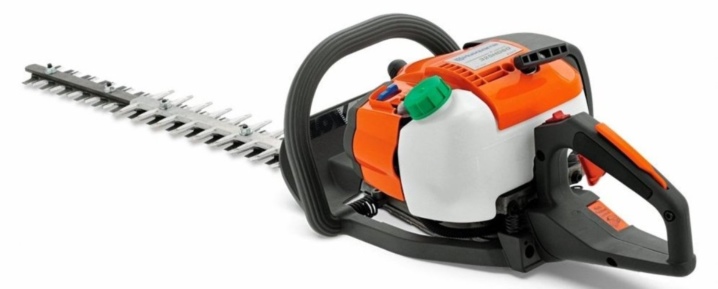
Speaking about cutting the crown, one cannot fail to mention its shaping. Inexperienced gardeners often cut so that the crown is rectangular.
This approach is fundamentally flawed, since it prevents the full penetration of sunlight to the branches located on the lower tiers.
Due to the lack of sunlight, the lower needles gradually begin to dry out and fall off, exposing the trunks. As a result, the hedge loses all its decorative properties, and the functionality of the planting is significantly reduced.
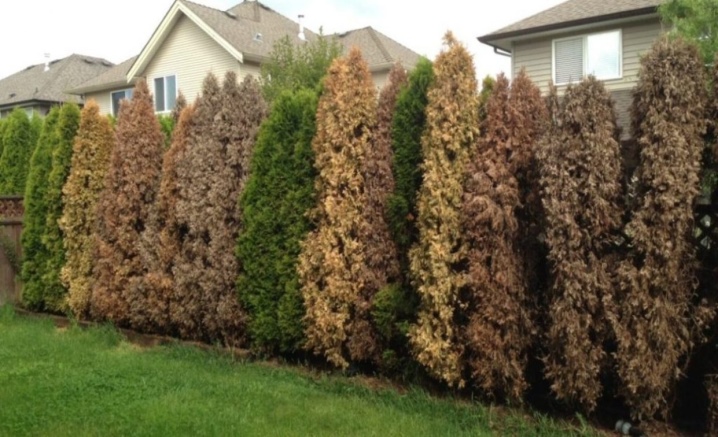
It will be correct to give the crown a trapezoid shape. In this case, the upper and lower branches will receive the same amount of light, so the needles are stored everywhere. Such a fence will be solid from the ground itself, this fully meets all the requirements for living fences.
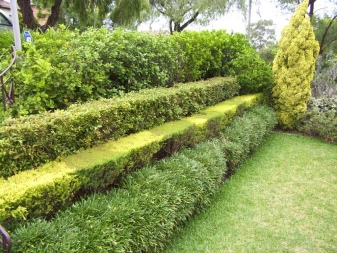
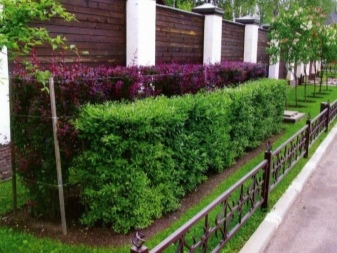
You will learn more about how to make a spruce hedge from the video.
Examples in landscape design
Coniferous hedges look spectacular on the personal plot - they compare favorably with all other variants of "living fences" in that they retain their decorative effect all year round.
Such fences are harmoniously combined with herbs and flowers in summer.
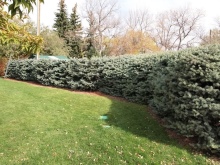
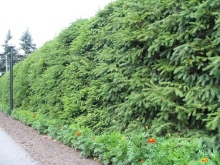
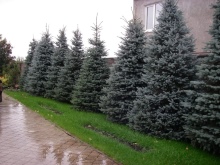
And in the snowy winter, spruce hedges create a unique atmosphere of a fairy tale.
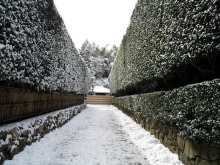
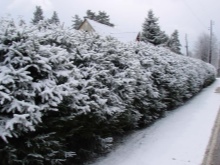
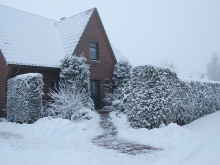



































































The comment was sent successfully.